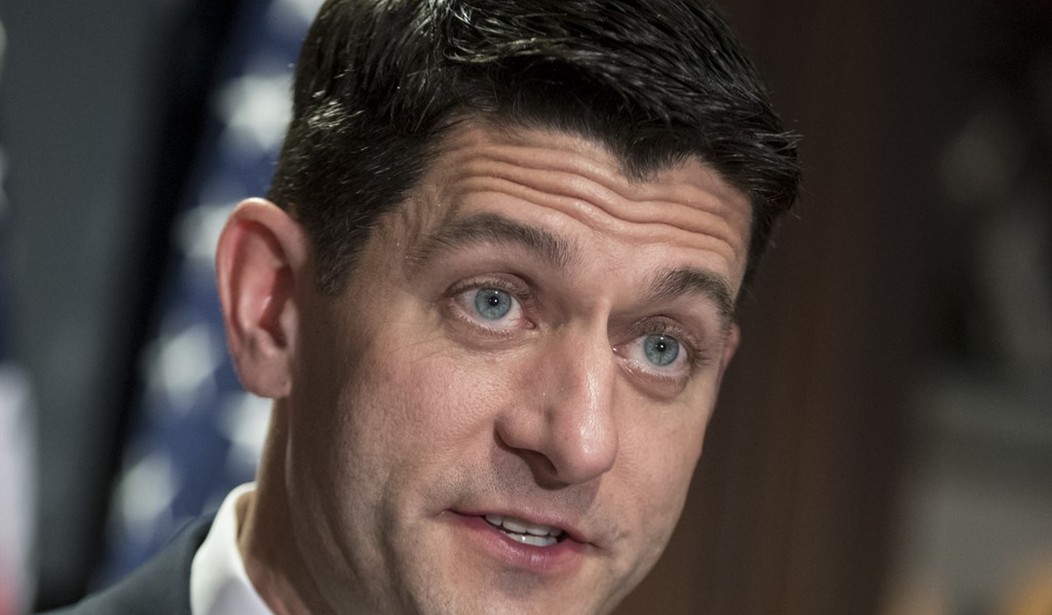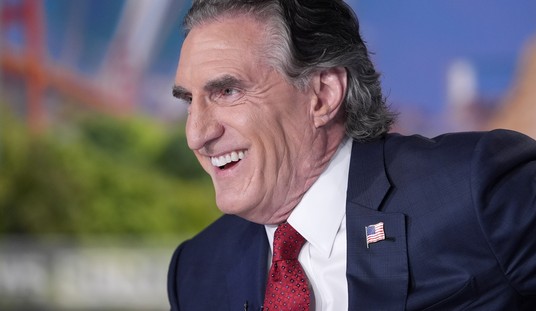Last week, the Washington Post created a 90-minute wonder with a scoop: leaked audio from a meeting of House Republicans supposedly contained an admission from Majority Leader Kevin McCarthy that Vladimir Putin had paid off Donald Trump. It became painfully obvious that McCarthy and several Republicans were joking during this exchange, but at least for a brief period of time, it was hot news. It did leave another question, though — who was the leaker? Hugh Hewitt asked Paul Ryan about the whodunit this morning, and whether he believed the rumor that former Capitol Hill staffer-turned-presidential candidate Evan McMullin engineered it.
Ryan … didn’t exactly debunk the idea:
HH: Second story alleged that you’re worried about tape recordings of leadership meetings. True or false?
PR: Well, that was, it was, I’ve never seen anything like this. There was somebody who taped a meeting a year ago where our Majority Leader cracked a joke, and then they released the tape of that joke out just a few days ago. And that’s a pretty bizarre thing to happen, so obviously that’s a cause of concern of ours.
HH: Do you believe it was Evan McMullin?
PR: I’m not going to speculate on who that is. That’s the name most people, you know, you hear about.
It’s possible, but probably impossible to prove or disprove without an admission by the culprit, whomever it might be. One question would be when the joking took place. McMullin worked as an adviser to House Republicans until he launched his independent bid in August 2016. The Trump-Putin payoff accusations didn’t really start up until two weeks after McMullin got in the race, though, when Hillary Clinton campaign manager Robby Mook first launched them as a way to distract from questions about the Clinton Foundation. Before that, Trump got plenty of criticism for praising Putin’s brand of leadership, but the collusion/payoff accusations came later on. This example of gallows humor from Republican leadership might not have had much inspiration by the time McMullin left, but who knows?
Hewitt also focused on a controversy over the status of the ObamaCare repeal bill. When the House finally muscled up a legislative majority to pass the American Health Care Act (AHCA) two weeks ago, it appeared that one of the primary motivations was to get it off their hands. Yesterday, however, Bloomberg News reported that the ObamaCare bill never made it over to the Senate. It got caught up in waiting for the CBO scoring, which has taken long enough that it could require another House vote to push it to the upper chamber.
Ryan disputed that analysis, and told Hugh Hewitt that the House held the bill out of “an abundance of caution”:
HH: Do you have to revote the American Health Care Act as has been reported because of missing targets?
PR: No, we don’t think that’s the case. What we’re doing is very, very, you know, it’s just a technical non-issue, is what it is. It’s we’re just out of an abundance of caution, we’re waiting to send the bill to the Senate for the final CBO score. The CBO score basically has to be in deficit compliance, meaning it can’t produce a deficit. It has to save. And the last CBO score we had, it saved $150 billion dollars. The only change that we’ve made since that CBO score was an $8 billion dollar amendment. So, but we just want to, out of an abundance of caution, wait to send the bill over to the Senate when we get the final score. So we’re just basically being overly-cautious, but there’s really kind of a non-issue here.
If that was the case, then why rush the vote before getting the CBO score at all? The answer to that question is obvious — once you’ve successfully herded the cats, you don’t wait three weeks to put them in the corral. As it was, the bill only passed on a 217-213 vote, so Ryan didn’t have much room to wait around for the CBO score.
But why would waiting be a problem, anyway? The only real procedural obstacle on sending a bill from one chamber to another is an end of the session, in which case the new Congress has to start over entirely. There is a timing issue on bills sent from the full Congress to the White House for presidential signatures — ten days of the Congressional session after full passage, after which a bill becomes law with or without a signature, unless specifically vetoed. If a recess occurs before the ten days are up, however, the inaction becomes what’s known as a “pocket veto” and the bill dies. But there are no such timing issues within a Congressional session between the House and Senate.
The assumption in this case would be that the House would have to revote to fix the bill if the CBO didn’t find a deficit reduction of at least $2 billion, the threshold to qualify for reconciliation. That was highly unlikely anyway; Ryan’s calculations above echo what Bloomberg reported in its piece. But even if the CBO does somehow find no deficit savings in this version, the Senate could have rewritten the bill anyway to address it without a revote first in the House on new language. And in this case, we can already expect the Senate to rewrite much of the AHCA while keeping the shell of it in place, in order to satisfy the origination clause in Article I Section 7 on revenue.
Ryan’s wrong about one thing, though. In the end, the House will need a do-over on the AHCA, but only after the Senate rewrites it. We’ll see whether Ryan’s skill at cat herding remains at its peak when that time comes.








Join the conversation as a VIP Member